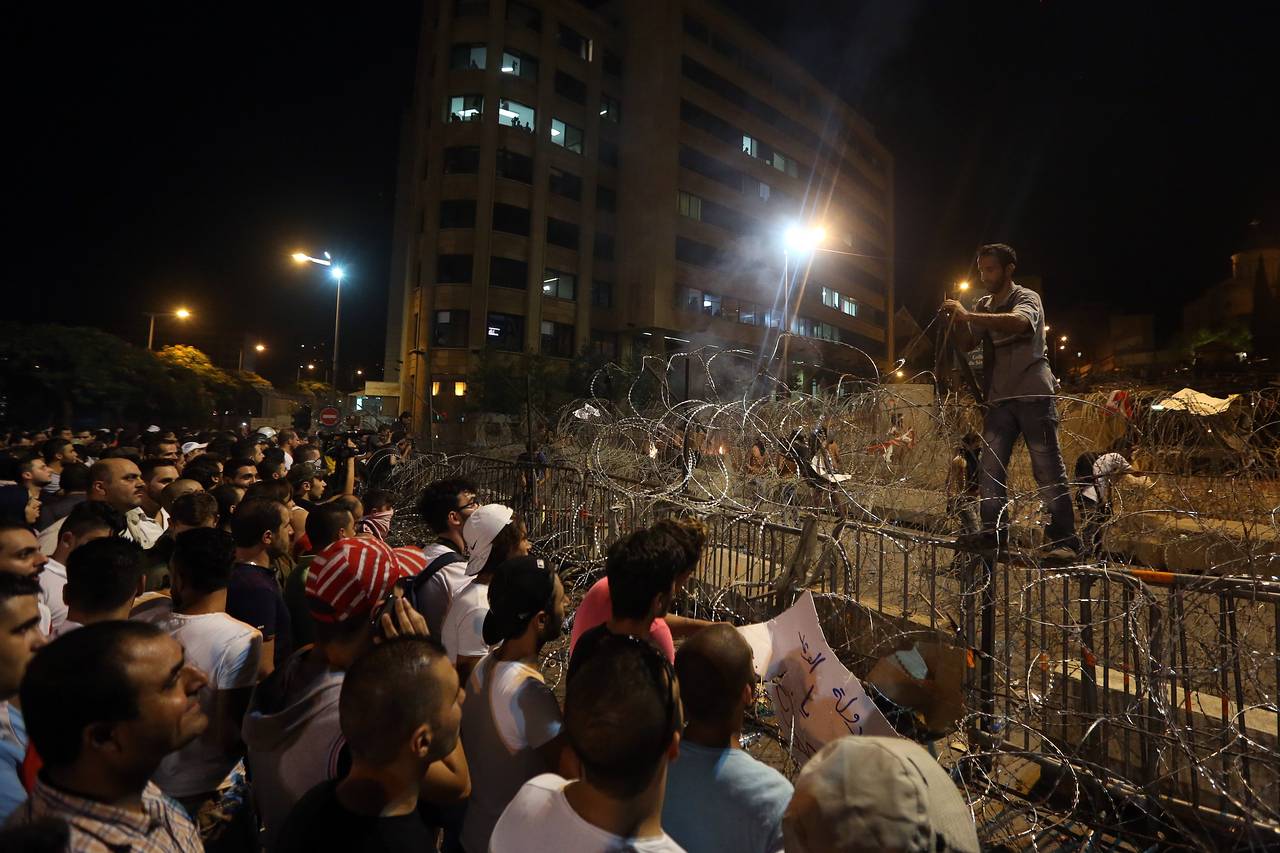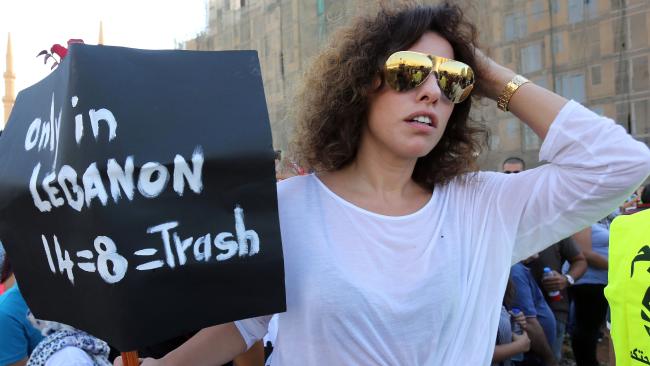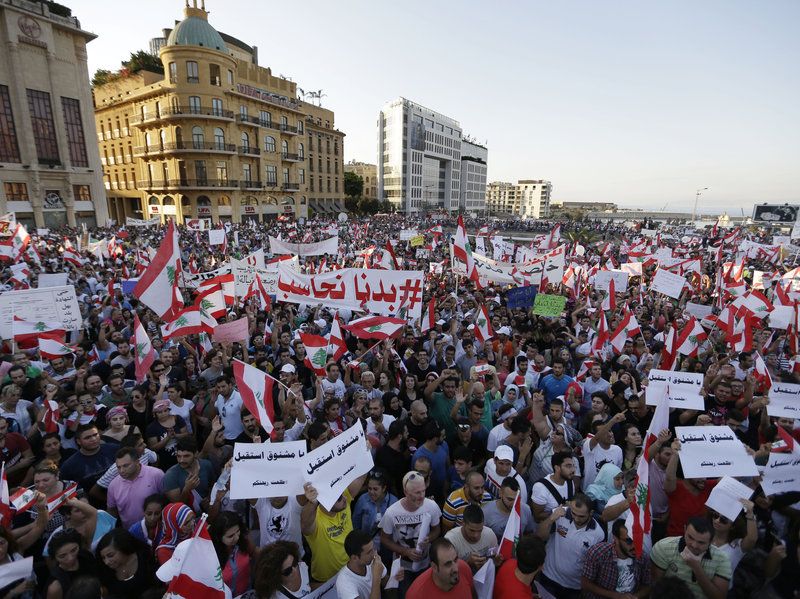By Dana Ballout and Matt Bradley


BEIRUT—A top Lebanese official on Sunday defied demands from thousands of protesters over the weekend to step down, providing potential fuel for a growing antigovernment movement that is coalesced around uncollected trash.
Environment Minister Mohammad Machnouk’s announcement came hours after thousands of protesters gathered in historic Martyrs’ Square in downtown Beirut on Saturday night in the largest show of force yet for the so-called “You Stink” movement. The protesters plan to hold more demonstrations in Beirut in the coming week, but officials have rejected calls for resignations, warning that it would create more governance problems.
“I won’t give up on my responsibilities during this critical stage,” he said in comments to the An-Nahar newspaper late Saturday as the protest ended. “The resignation of the cabinet is out of the question for all political powers because it means a leap into a vacuum and chaos.”
You Stink campaigners said Sunday that they will soon announce a response to Mr. Machnouk’s refusal to resign.
“The minister already gave up on his responsibilities when he failed to address and resolve the garbage crisis,” said Lucien Bourjeily, an organizer. “If he doesn’t resign then he must be dismissed. He’s failed as a minister of environment.”
Activists organized the original “You Stink” movement earlier this month. The group demanded that Lebanon’s government end a trash crisis that began when residents south of Beirut barricaded a landfill, after complaining of toxic fumes. Giant piles of malodorous garbage have been left uncollected on the city’s streets as a result.
As the size of the crowds increased, activists expanded the scope of demonstration. People marched over the weekend demanding that the country’s politicians be replaced, railing against a system that has for decades seen legislation gridlocked by sectarian differences within parliament.
Saturday’s rally, the largest since protests began in Beirut earlier in August, remained largely peaceful. A skirmish between police and demonstrators toward the end of the night saw two police officers injured and about 10 protesters arrested.
But Mr. Machnouk’s resistance to the demands for his resignation risks inflaming antigovernment sentiment, just as activists prepare for even larger demonstrations this week to press their case for political reform. Leaders of the so-called “You Stink” movement told Lebanese media on Saturday that they hope to expand the protests beyond Lebanon’s capital.
Speaking through a loudspeaker in Martyrs’ Square on Saturday night, one YouStink organizer also called for the “accountability” of Lebanon’s interior minister and those responsible for what many protesters felt was excessive police force. Last weekend, police used water hoses and tear gas to subdue crowds.
If the protesters’ demands weren’t met within 72 hours, he said, there would be a call for fresh demonstrations, and a widening of demands to include new parliamentary elections and a sustainable environmental solution to the garbage collection crisis.
Saturday’s rallies bookend a week of agitation in central Beirut that has seen dozens of protesters injured or arrested; broken windows in some downtown businesses; and reams of razor wire left in front of the Grand Serail, the palace that houses the office of Prime Minister Tammam Salam that has been a gathering point for protesters.
The crowds that gathered on Saturday point to swelling public frustration that unlike previous political movements in Lebanon has largely avoided past sectarianism and political partisanship.
But as the protests widen and politicians seek to make common cause with antigovernment demonstrators, activists said they are working to safeguard the purity of a movement that has galvanized Lebanese across the political spectrum.
In the hours after Saturday’s march, leaders of Lebanon’s most influential political parties—the same groups whose inefficiency and perceived corruption have made them targets of activists’ frustration—voiced support for the movement.
“Today’s significant civil presence, with young men and women of Lebanon gathering at Martyrs’ Square, reaffirms that we have all fallen far from their hopes and aspirations,” read a statement posted on Sunday from the Sunni Muslim-dominated Future Movement party.
Iran-backed Shiite militia and political party Hezbollah also declared its support for the protesters, but didn’t maintain a visible presence at Saturday’s rally.
Write to Dana Ballout at dana.ballout@wsj.com and Matt Bradley at matt.bradley@wsj.com
About yesterday protests:

NPR:
Thousands took to the streets in Martyrs’ Square in the Lebanese capital of Beirut on Saturday for the second week in a row to demand government accountability and solutions for a mounting garbage crisis.
Also for the second week in a row, the diehard protesters were dispersed by force. As the sun set and the families went home, a faction of protesters tried to break through barricades protecting the government palace. Police chased them down with batons, clearing the entire downtown and arresting stragglers.
Hours earlier, the mood was different. Clerics in flowing robes stood alongside scantily clad 20-somethings snapping selfies. Parents brought their young children and grandmothers linked arms. Even people in wheelchairs and visibly pregnant women braved the crowds. Homemade signs abounded.
They came despite the violent dispersal last weekend. The government has opened an investigation into the use of excessive force, including rubber bullets and live ammunition fired in the air by the security forces. Some of the protesters arrived still bearing their bruises.
Jean Moukazel, a construction contractor, said he was beaten by the police last weekend, but that didn’t stop him or his wife from returning to demand that the government step down. He says leaders have failed to provide even the most basic services, like water and electricity.
"The only thing Lebanese had was hope and dreams," Moukazel said. "And now they’re dreaming about leaving the country, and that’s why they’re demonstrating. We want [the government’s] resignation to create a new government and parliament so we can have a hope of having a new Lebanon — the Swiss of the Middle East, as it was a long time ago."
He says he worked outside Lebanon for 25 years, but he wants to fight for his future in his own country. He thinks the demonstrations will keep growing.
"Last week was smaller: Saturday, Sunday bigger," he said. "Today much bigger, and tomorrow even bigger. It will grow. It’s like a snowball."
Protests haven’t just become bigger; they’ve become more organized, marching under the banner #YouStink. Organizers began their march Saturday in matching T-shirts, flanked by people on bicycles and scooters. Police cars and ambulances trailed behind.
"From north to south, from Bekaa to Beirut, a people united never die!" organizers shouted from megaphones amplified by trucks full of speakers. Women and men took turns leading protests, as demonstrators line-danced, drummed and chanted along.
The organizers are now calling for a sustainable solution to the garbage crisis and accountability for the interior minister and those who ordered force against demonstrators. #YouStink has promised more demonstrations in all parts of Lebanon on Tuesday if the first demands aren’t met.
Other demonstrators aren’t willing to wait, and have vowed to take to the streets again Sunday to demand that the entire government resign in one go.
One of them is Ali Dawi, who came with his baby boy slung around his chest. Dawi wants a new government of technocrats. He says that bringing his newborn to the protest is a statement.
"The money of this little boy has been taken by this bunch of corrupt politicians," he said. "His future is in danger much more if they remain."
But not everyone is so sure. With the Syrian civil war raging next door, some worry that demonstrations here could unleash sectarian violence in a deeply divided country.
"Even if we did 100 years of peaceful protests, this regime won’t go down except with violence," said Khodr Sobah as he watched the march pass by.
Flanked by his wife and three young daughters, Sobah said he supports the demonstrations but has little hope that they will continue peacefully.
"Those political leaders stuck to their chairs won’t go in the name of peace or civility," he said. "Even if all the Lebanese people took to the streets and told them to."
Sobah pointed out that many current political leaders were born out during the violence of the country’s 15-year civil war.
"All of these politicians came to power by blood," he said. "They’re all ex-warlords, and they won’t go except by blood."
How a garbage crisis ignited a thousands-strong movement in Lebanon
BEIRUT, Lebanon—Six-year-old Mina is talking animatedly about Saturday’s upcoming protests. “We want water! We want electricity!” she says, skipping down the street on the way to the demonstration.
Lebanon’s older generations agree with her. Over the past week, downtown Beirut has turned into a nightly battleground between riot police and protesters, demanding an end to the trash crisis that has suffocated the country for the past month, and more recently, the corrupt politicians that can’t provide basic services—such as reliable power, water, and sanitation—to their own people.
Saturday was anticipated to be the biggest night of protests yet, with crowd estimates as high as 50,000 people.
While many of the protesters prepared for the worst, carrying scarves to protect themselves from teargas inhalation, and scrawling the legal aid hotline number on their arms in case of arrest, the mood was festive. Many carried banners, calling out the corruption of the state, or wore costumes and props referencing the garbage crisis and Lebanon’s woeful environmental policies.
“Every day I come down to support the protests,” said Abu Mahmoud, 49, who drives from the northern city of Tripoli every night to serve coffee at the demonstration. Saturday night, he was stationed in the center of Martyr’s Square, flanked by two traditional, long spouted coffee pots and a tall stack of plastic cups.
“We don’t have electricity, and we don’t have water,” he continued, referring to the routine power cuts and water shortages that the country has experienced since the end of its 15-year Civil War in 1990. In addition to a decimated infrastructure following the war, a series of privatization schemes created monopolies of many public services, leaving swaths of the country—especially outside of the more privileged capital—without necessities like power and water for hours on end every day.
“Now garbage,” Mahmoud said, smiling. “That we have.”
AP
Lebanese anti-government protesters burn a mattress on a barbed wire barrier that blocks the road to the government building, during a demonstration in downtown Beirut, Lebanon, Saturday, Aug. 29, 2015. Thousands of people staged the largest of the demonstrations that began last week over garbage piling up in the streets of Beirut following the closure of a main landfill. The government’s failure to resolve the crisis has evolved into wider protests against a political class that has dominated Lebanon since the end of the country’s civil war in 1990 and a government that has failed to provide even basic services to the people. (AP Photo/Hussein Malla)
Last month, the government, owing to over-capacity and health concerns that has been a source of controversy in the country for years, closed the Naameh landfill, the largest in Lebanon. The landfill was opened as an emergency solution for waste management in 1996, and was intended to remain open for two years, holding a maximum of two tons of waste. Almost 20 years later, the landfill is still in operation, now holding 20 tons of waste, a capacity issue that has contributed to the destruction of the surrounding environment and higher rates of cancer and other diseases in the surrounding community.
While the landfill’s closure was initially a victory for local activists, the government timed the closure with the end of its contract with Sukleen, the waste management company responsible for picking up waste in Beirut and surrounding areas. Although the government knew that the landfill would reach capacity, and that their contract with Sukleen would end as far back as six months ago, it never made an alternative plan for managing the waste.
As a result, Beirut became a landfill of its own.
Trash began piling in the streets, makeshift back alley dumps turned into small mountains of garbage on major boulevards. As the weeks wore on, the stench of rotting meat carcasses swirled with fumes from burning plastic, hanging thickly in Beirut’s notoriously humid summer air. Walking down the street became an exercise in avoiding the putrid smell of rotting garbage.
Many began to take to the streets, organizing protests under the slogan #YouStink to refer to both the stench in the air, and the politicians responsible for not bothering to devise a solution.
“We’ve had corruption for a long time,” said Nadia, a 28-year-old protester that works as a translator. “But it was trash that made people take to the streets.”
AP
Lebanese policemen stand guard after dispersing a demonstration against the trash crisis and alleged government corruption, in downtown Beirut, Lebanon, Saturday, Aug. 29, 2015. Some thousands of people staged the largest of the demonstrations that began last week over garbage piling up in the streets of Beirut, and the government’s failure to resolve the crisis has evolved into wider protests against a political class that has dominated Lebanon since the end of the country’s civil war in 1990. (AP Photo/Bilal Hussein)
And while the trash has been a uniting source of inspiration for demonstrations, it is only one of a long list of grievances. Beyond being able to provide basic government services—like reliable water, electricity, and sanitation—protesters are decrying Lebanon’s deadlocked political system, which has been unable to agree on a president for more than a year.
“We need new electoral laws, ones that aren’t left over from the Civil War,” said Ali Msarrah, a 32-year-old-protester carrying a sign reading “Mia Khalifah [a popular Lebanese-American porn star] for President.”
“All of our government is political prostitution,” he continued. “Really, Mia Khalifah would be great for the job.”
Once the term of former President Michel Suleiman ended, the Lebanese Parliament—which must elect a new president based on a two-thirds majority vote—met repeatedly, but could not come to a consensus. Now, elections have been delayed until 2017, a decision based on the neighboring war in Syria, which has provoked the delicate balance between factions in Parliament. While some are aligned with the March 8 Movement, which supports Syrian President Bashar al-Assad’s regime; others are aligned with the March 14 Movement, which is staunchly opposed.
The cold proxy war has gripped Lebanon, and in the absence of meaningful political leadership, has thrown the country into a power vacuum, controlled by politicians known more for their roles during the Civil War—and corruption in the years that followed—than their leadership.
The garbage in the streets has become an accidental metaphor for the politicians; the oppressive, unavoidable stench of rotting trash in the streets, their corruption. Protesters are demanding an end to both.
“The people want an end to the regime!” protesters shout, echoing the chant popularized by the 2011 demonstrations in Tunisia, Egypt, Bahrain, Yemen, and Syria.
“Revolution, revolution!” others echo.
While Saturday night ended peacefully, many are still mobilized—and disturbed—by the extensive police brutality exhibited over the past week, which has seen more than 400 injuries. Several went to the hospital; one in critical condition. Both the Lebanese Internal Security Forces and the Lebanese Army have extensively used teargas and water cannons to disperse the crowds. The irony of using a water cannon to disperse a demonstration gathered to protest the corruption that has lead to, among other things, water shortages, is lost on no one.
“It started with the garbage,” said Nidal, a 27-year-old protester. “But now it is about so much more than that.”





